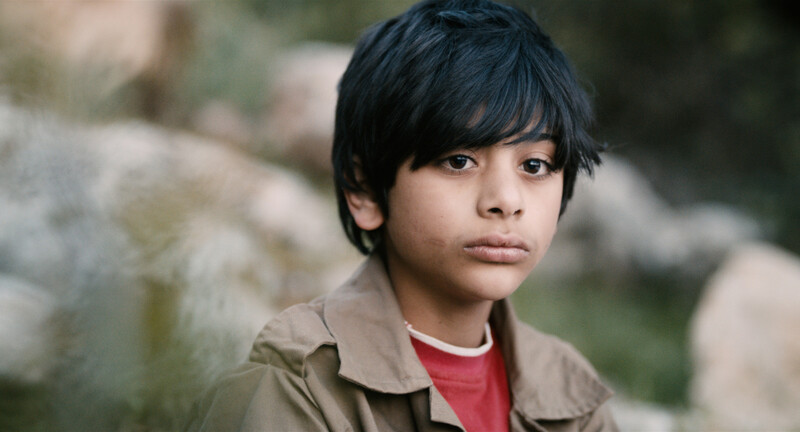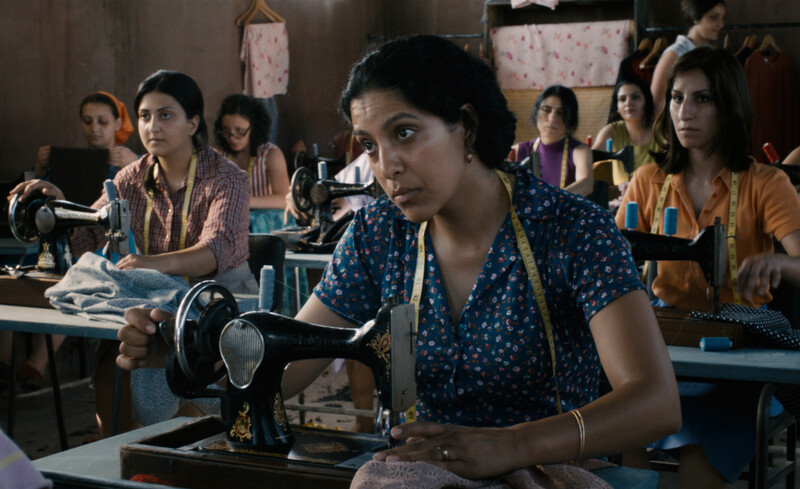The Electronic Intifada 3 June 2013

Mahmoud Asfa as Tarek in When I Saw You
In interviews, Palestinian artists — writers, painters, filmmakers, musicians — often find themselves discussing the tension between being true to their art, and being expected to be a spokesperson for their people.
Annemarie Jacir’s latest film is one of the increasingly accessible range of works from Palestinian artists which should be seen because they are good art, not as acts of political solidarity.
When I Saw You is set in 1967, in the immediate aftermath of the Naksa (setback in Arabic) — Israel’s victory in the 1967 War and its occupation of the West Bank, Gaza, the Syrian Golan Heights and the Egyptian Sinai.
A new wave of Palestinian refugees has poured over the Jordan River and is swelling United Nations-run camps, some already inhabited by those who were forced out in 1948.
Among them is a young boy, Tarek (the highly photogenic Mahmoud Afsa) and his mother Ghaydaa, played by Rula Blal. The latter may be familiar to Western audiences for playing the role of Fatima — jailed for attempting to bomb an Israeli cinema — in Julian Schnabel’s movie Miral. In that performance she was the highlight of an otherwise deeply flawed film; in When I Saw You she is equally excellent, but in better company.
Bullied
Tarek is seemingly — although the issue is never clearly explored — autistic. He has some of the mathematical genius of a savant like Dustin Hoffman’s character in Rain Man, although to lesser extremes, and his phenomenal numeracy is coupled with being unable to read and to fully function socially.
He is bullied by the other children in the camp — as we see from the very first scene — and even the schoolteacher cannot be bothered to put up with him, excluding him from class (possibly for exposing the teacher’s own errors). Most fundamentally to the film, Tarek is totally unable to grasp his new situation, the whereabouts of his absent father — lost in the chaos of war — and the fact that there is now a militarized border between him and his old home.
Thrown out of school, the first part of the film sees Tarek rattling around the camp, his days measured out by the aimless routines of refugee life — the doling out of food rations and the arrival of more lorries carrying those fleeing Palestine, but never bringing his father.
Tarek’s failure to grasp his new reality is contrasted with the world-weary girl he has a crush on; she declares that she will become a fighter, and marry one, but ruthlessly negates his plans to return home with a contemptuous click of the tongue. She knows that this, at least, is just a dream.
Mascot

Ruba Blal as Ghaydaa in When I Saw You
Inspired by a bravura television address from Yasser Arafat, Tarek runs away and finds himself in a second camp — this time a training base for Palestinian fedayeen, or fighters (including women), preparing for raids on Israel. There, even after his mother arrives searching for him, he becomes a kind of camp mascot.
The fighters happily incorporate him into daily life, getting beaten at cards because of Tarek’s numerical talents but — as Tarek is incapable of doing — understanding that as a child he is not really “one of them.”
Jacir’s portrayal of daily life is full of precise details which make it a joy to watch. Copies of Mao’s Little Red Book sit in the corners of tents, and the fedayeen discuss issues of class and religion. The excellent music (if ever a film warranted a soundtrack album, this is it) features both Palestinian resistance songs like Akka Prison and 1960s pop, including Cat Stevens’ international hit The First Cut Is The Deepest — which dates from Spring 1967.
And when the fedayeen receive a crate of military boots, one asks if they are Belgian — a reference to the fact that, in the 1970s, Palestinians were called Baljikiyyah or Belgians by Jordanian soldiers, because their military kit was sent from Belgium, unlike the US gear of the Hashemite army.
These references are not just historical geekery, however, and the soundtrack is skilfully used. The poignant Cat Stevens song kicks in just as Tarek walks away from his mother to sit with his fedayeen comrades.
It’s the culmination of a series of scenes which signal his attempted — if premature — assertion of adult masculinity and his breaking-away from her. And a rhythmic dabke (traditional dance) scene isn’t just folkloric color; the pounding beat segues into a backdrop of the camp commander, Abu Akram, pistol-whipping his recruits during a training session.
Tensions mount
However, Tarek’s idyllic life in the training camp is short-lived; as tensions mount along the border, Israeli raids increase and plans for action by the fedayeen take shape. On the one hand, Tarek is unable to perceive conflicts within the camp, younger fighters champing at the bit while the older hands urge more training. And on the other, he cannot comprehend that in the end, he is not a real fedayee.
He is bitter and angry at being left behind when other fighters go on a camp raid, lashing out at his mother and Layth (Saleh Bakri), who first brought him to the group. Tarek’s obsessive desire to return home — oblivious to the dangers of the border — drive him on, and bring the film to its ambiguous, questioning, heartbreaking conclusion.
When I Saw You is a high-quality piece of independent cinema. It features excellent performances — especially from the teenage Afsa as Tarek — and is elegantly shot, a contemplative portrait of a young boy who never quite fits into his surroundings, and his now-impossible search for the place where he can make some precarious sense out of life.
There are no answers here; despite its historical verisimilitude, this is not a quasi-documentary. It presents questions — about place, gender, power, love and separation — but invites the viewer to think and watch, rather than telling them what they should know and believe.
When I Saw You eminently deserves the many awards it has already won, and it can only be hoped that audiences get the chance to see it on general release.
When I Saw You opens in cinemas in Jordan and Switzerland on 13 June, in Belgium on 15 July and Lebanon on 15 August. For more information visit the film’s website and Facebook page.
All images courtesy of Philistine Films/Lamma Shoftak LLC.
Sarah Irving is a freelance writer. She worked with the International Solidarity Movement in the occupied West Bank in 2001-02 and with Olive Co-op, promoting fair trade Palestinian products and solidarity visits, in 2004-06. She is the author of a biography of Leila Khaled and of the Bradt Guide to Palestine and co-author, with Sharyn Lock, of Gaza: Beneath the Bombs.





